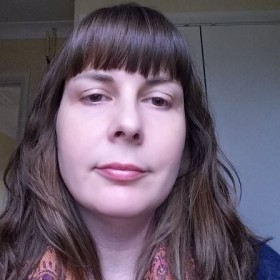Many of the best-loved female writers have suffered from mental illnesses. In fact, their suffering has often been as much of a draw as their actual writing (in a way that isn't really seen with male writers) – take, for example, the case of Sylvia Plath, and the huge interest and fascination surrounding her suicide. This is fortunately becoming less and less the case as mental illnesses gradually cease to be a taboo - celebrated female writers can talk honestly and openly about their mental health without it overshadowing their work.
There are lots of wrong ways to talk about immensely talented female writers who also happen to have mental health issues. VICE magazine created a hugely controversial photo editorial for their Women in Fiction Issue. A fashion spread used models to depict seven female writers who had committed or attempted suicide. The photographs recreated those events – Sylvia Plath is looking into a gas oven for instance – and the only words were the fashion credits and a few details about the writer's death. Their novels, poems, letters are all unmentioned.
It is too nosy simply to go through the biographies of female writers with mental health issues, and undermines their work. It seems a lot more appropriate to look at how the writers themselves explore and use their mental illness in their creative work, so here are a handful.
J.K.Rowling
Rowling is one of the most successful writers of all time. She has sold over 400 millions copies of her books and is richer than the queen. She has spoken openly about her depression, saying that she was acutely depressed from about 25 to 28. The Dementors, creatures in her Harry Potter series that feed off human happiness, are based on her experiences of depression. Speaking to Oprah, Rowling said, "it's so difficult to describe to someone who's never been there because it's not sadness. Sadness is – I know sadness – sadness is not a bad thing. You know? To cry and to feel. But it's that cold absence of feeling – that really hollowed-out feeling. That's what the Dementors are."
"Dementors are among the foulest creatures that walk this earth. They infest the darkest, filthiest places, they glory in decay and despair, they drain peace, hope, and happiness out of the air around them… Get too near a Dementor and evry good feeling, every happy memory will be sucked out of you. If it can, the Dementor will feed on you long enough to reduce you to something like itself… soulless and evil. You will be left with nothing but the worst experiences of your life."
- Harry Potter and the Prisoner of Azkaban
Sylvia Plath
Plath wrote arguably her best, and definitely her most celebrated, poetry when she was severely depressed, making a defining contribution to a whole new poetical style - confessional poetry - which used the poet's personal feelings and events from their lives. Unable to sleep, Plath would rise in the early hours and write before her children woke up, creating the celebrated collection Ariel. Her only novel, The Bell Jar, is semi-autobiographical fiction, taking many events from her own life, including her depression, suicide attempt, and the electro-convulsive therapy she was administered as a supposed cure for her mental health issues.
"I saw my life branching out before me like the green fig tree in the story. From the tip of every branch, like a fat purple fig, a wonderful future beckoned and winked. One fig was a husband and a happy home and children, and another fig was a famous poet and another fig was a brilliant professr, and another fig was Ee Gee, the amazing editor, and another fig was Europe and Africa and South America, and another fig was Constantin and Socrates and Attila and a pack of other lovers with queer names and offbeat professions, and another fig was an Olympic lady crew champion, and beyond and above these figs were many more figs I couldn't quite make out. I saw myself sitting in the crotch of this fig tree, starving to death, just because I couldn't make up my mind which of the figs I would choose. I wanted each and every one of them, but choosing one meant losing all the rest, and, as I sat there, unable to decide, the figs began to wrinkle and go black, and, one by one, they plopped to the ground at my feet."
- The Bell Jar
Zelda Fitzgerald
Zelda Fitzgerald was the immensely creative wife of F. Scott Fitzgerald (famous for writing The Great Gatsby). A writer, painter and ballet dancer, F. Scott considered her the original "flapper", and together they were the golden couple of the Jazz Age. However, from 1930 to the end of her life in 1948, Zelda spent much of her time in hospitals and sanatoriums, diagnosed with schizophrenia (though nowadays it is accepted that it was probably bipolar disorder). It was whilst she was being treated in a hospital that she began writing for two hours a day as part of her therapy, eventually writing an entire novel, Save Me The Waltz, within six weeks. The book was a semi-autobiographical account of her and F. Scott's life together, including her struggle to become successful independently of her husband. F. Scott was furious as about the novel as he was using much of the material for his own book, Tender Is The Night.
"Emptying the ashtrays was very expressive of myself. I just lump everything in a great heap which I have labeled 'the past', and having thus emptied this deep reservoir that was once myself, I am ready to continue."
- Save Me The Waltz
Emily Dickinson
Emily Dickinson was an American poet, known for her reclusive life. Never being diagnosed with a mental illness, it is largely through recollections, her letters and her poetry that literary critics and commenters have deduced that she had mental health issues. The themes of death, morbidity and depression do appear frequently in her poetry, though as a keen botanist, she also writes often of flowers and gardens, as well as the internal life amongst a range of other topics.
"There's a certain Slant of light,
Winter Afternoons--
That oppresses, like the Heft
Of Cathedral Tunes--
Heavenly Hurt, it gives--
We can find no scar,
But internal difference,
Where the Meanings, are--
None may teach it -- Any --
'Tis the Seal Despiar--
An imperial afflication
Sent us of the Air—
When it comes, the Landscape listens--
Shadows--hold their breath--
When it goes, 'tis like the Distance
On the look of Death--"
- A Certain Slant of Light
This article was first published in 2 June 2014
Photo: Janaina C. Falkiewicz










Really interesting stuff - Its good that mental illness is becoming less of a taboo subject. We need to keep it on the agenda to ensure until it is no longer considered something to be ashamed of. Keep up the good work.